QuestionHi Jessica,
This question might seem a little unusual, but here it goes... I have 6 cats, all of whom (except 1) live exclusively indoors. I adopted the one cat ("Stewart") who does go outside about a year ago. He was a neighborhood stray who was initially shy and reluctant to come near me, but over time I managed to befriend him. Once he trusted me enough, I took him in to get neutered and vaccinations, and of course, by that time I was totally smitten with him.
While I generally favor cats to be indoors, with this particular guy it is nearly impossible to keep him in (he is obsessed with the outdoors) and when I do keep him in, he becomes visibly depressed and physically acts out against my other cats. He does stay indoors during inclement weather, as well as overnight. He will also come in for a few hours, on occasion, during the day. When it gets colder outside, he spends most of his time indoors. I think he stays around my house most of the time, but sometimes he does ventures out, but I don't know how far he goes. In short, he is a sweet little guy who seems to "love" me, as well as his neighborhood.
Anyhow, I've been thinking about moving to a new home lately, but I'm afraid to do so because of Stewart. Stewart would, without a doubt, come with me no matter where I went, but I fear (and perhaps this is an irrational fear, which is why I'm asking you this question) that if I do move, he will try to go back to my old home. You hear about things like this happening--cats traveling many miles to get back to an old home or family. If I did move, I would keep him confined for at least a month before I'd let him venture outside my new home, but I know this will be difficult for him (he really is obsessed with being outside!!). I also fear the possibility of having neighbors who won't take kindly to him (i.e., at least where I live now, no one has ever complained about him).
So, I guess I'm wondering if you think this is something I should be concerned about. It is very possible that I'm blowing this all out of proportion, but I tend to worry a lot, especially when it comes to my cats. Thanks!
AnswerI certainly know the feeling of irrational worry! My cats are the world to me.
However, this one is not irrational at all. Cats DO try to travel back home. Like bats and birds and a handful of other creatures, they've got what's called a homing instinct. A cluster of magnetic cells in their brains leads them home, even over miles and miles, sometimes hundreds, and there are even reports of thousands. I myself had one return to our old home twice, after escaping the new place. Fortunately, the new residents recognized him and called us, but it took him a good month to get back the first time, and he was tattered and beat up and dirty, sunburned so badly that his ears were curled back, and skinny as a rail!
Anyway, it generally takes about 2 months for those magnetic cells to be reset to their new home (though my cat still returned home after 6 months!), so Stewart should be kept in at least that long if at all possible.
My cats all used to go in and out. But after we moved from a farm to a highway, we decided to keep them inside. By the end of two months, they'd all resigned to the fact that they were now indoors. Yes, they did dodge for the door and cry at the door at first. Now they rarely show any interest in going outside at all. In fact most are terrified!
My advice to you is, see how the two months that he'll have to be inside anyway go. If he's still miserable, then consider letting him out. If he's relaxed a little, it's the perfect time to make him a safe, indoor kitty! If not, see how letting him out goes. But do be careful of the neighbors! I've heard a ton of horror stories in my line of work of poisonings, cats shot with bb guns, hanged... And I myself had cats stolen, snatched by coyotes (those things are everywhere, even in the city!), become infected with deadly diseases, and be nearly killed by raccoons and dogs. If you see any evidence that these things might be a threat, seriously consider keeping him in permanently.
I personally have built outdoor kennels for my cats to go out in to enjoy the sun, birdwatching and fresh air. They have access to it at all times through a cat flap. I realize this is beyond what most are willing to do! But many of my friends have the patio enclosure from this company, and their cats adore them:
http://www.kittywalk.com/
Completely unsolicited, here, but just wanted to mention in case you weren't aware, feline leukemia, a contagious, incurable virus, is now the number cause of death by disease in cats who go outdoors. So if, and only IF he does go out, it would be a good idea to have him vaccinated against this virus. I have a "leukemia ward" at my house where I home leukemia positive cats who would otherwise have been euthanized. They typically last 6 months to a year or two before coming down with cancer or organ failure. Most die before their third birthday. It's a disease you definitely don't want Stewart to catch!
Unfortunately, it would be recommended for your other cats to be vaccinated against it as well, since Stewart has contact with them. If Stewart were vaccinated, the vaccine would be about 90% effective in protecting him from contracting the disease permanently. However, he CAN be infected with it transiently, during which time he would be contagious to your indoor kitties.
This is one issue very close to my heart. You see, when I allowed my cats outdoors, one became infected with leukemia. And upon retesting them all, we found several had become infected. And I'd never heard how common the disease was. So I just try to be sure everyone I talk to who has a cat that goes outdoors is aware of this terrible disease and how prevalent it is, and the importance of vaccinating.
If you decide to keep Stewart in, do not vaccinate any of your kitties against leukemia. It's impossible for them to catch it indoors, and the vaccine may cause vaccine associated sarcoma (VAS), malignant (and generally incurable) cancer at the site of the injection. However, in outdoor cats, the risk of contracting the leukemia virus is FAR greater than the risk of VAS.

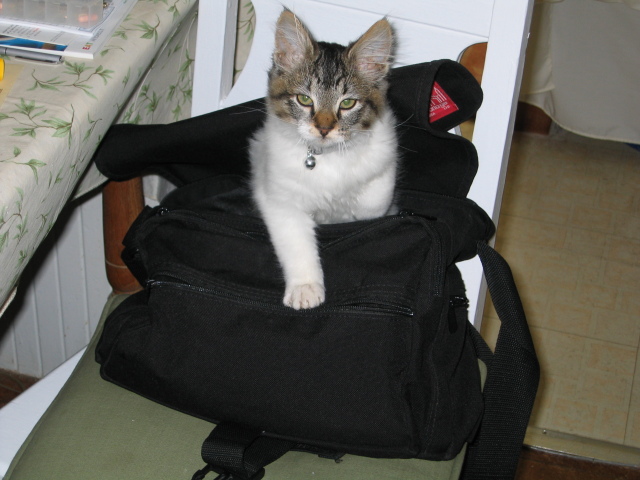 Injured tip of ear / Follow up
QuestionBagBoy
QUESTION: My 7-month-old cat, Har
Injured tip of ear / Follow up
QuestionBagBoy
QUESTION: My 7-month-old cat, Har
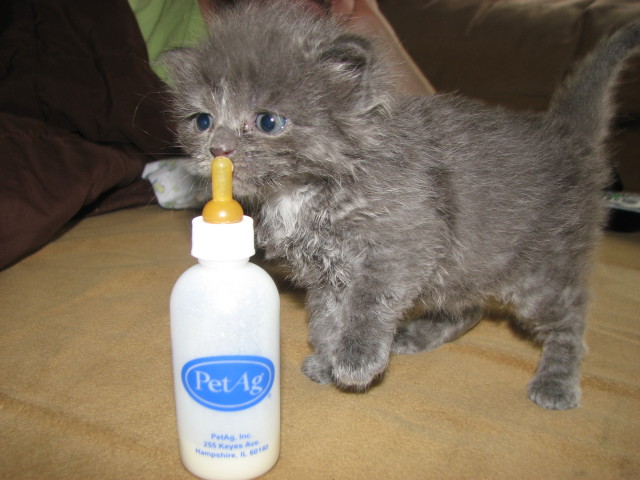 bottle feeding orphan kitten.
QuestionQUESTION: I rescued my kitten when he was 2 wee
bottle feeding orphan kitten.
QuestionQUESTION: I rescued my kitten when he was 2 wee
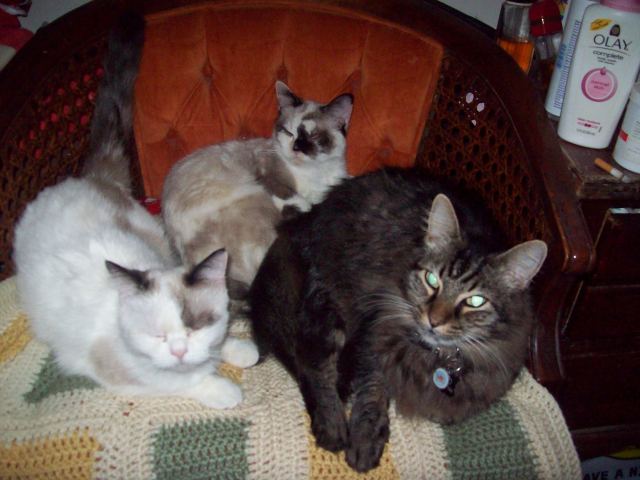 Litter Box Behaviour
Question
All Kitties
Hello!
Im writing to you fo
Litter Box Behaviour
Question
All Kitties
Hello!
Im writing to you fo
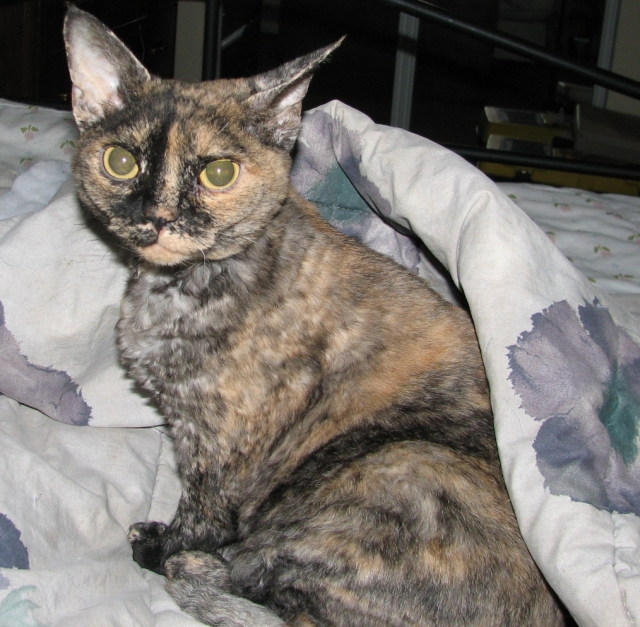 My cat is jealous of my other cat
QuestionQUESTION: Hi Ali. I hope you can provide
My cat is jealous of my other cat
QuestionQUESTION: Hi Ali. I hope you can provide
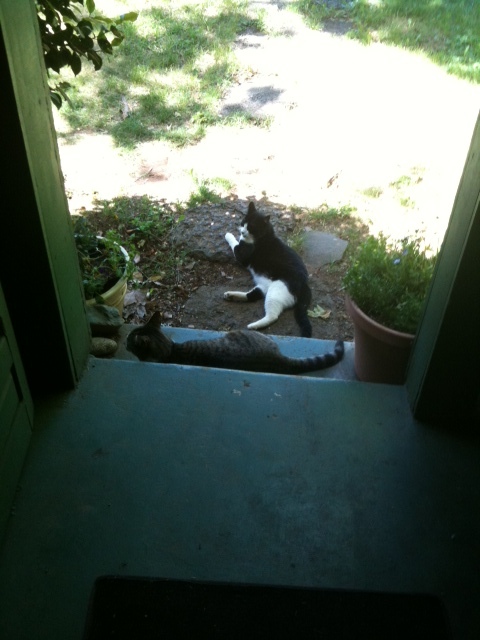 2 sibling cats. one of the brothers just passed.
Question
Their last day togethe
how should i dea
2 sibling cats. one of the brothers just passed.
Question
Their last day togethe
how should i dea